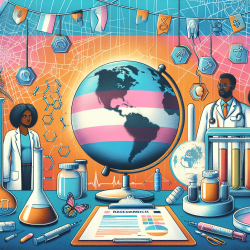Understanding Invisibilised Uncertainty in Transgender Health
The recent research article titled ‘Don’t think that we die from AIDS’: Invisibilised uncertainty and global transgender health by Reya Farber sheds light on a critical yet often overlooked issue in global health: the invisibilisation of transgender health concerns. This research is a wake-up call for practitioners who aim to improve their skills and provide inclusive healthcare services.
Key Findings from the Research
The study reveals how state-level processes and global health agendas contribute to medical uncertainty, particularly affecting transgender individuals. Conducted over 14 months in Thailand with 62 participants, the research highlights the gaps in data collection and health research that exacerbate health disparities. The term "invisibilised uncertainty" is introduced to describe how certain social groups and health issues are marginalized in research, leading to a lack of comprehensive healthcare solutions.
Why This Matters to Practitioners
For practitioners, understanding these findings is crucial for several reasons:
- Improved Patient Outcomes: By acknowledging and addressing invisibilised uncertainties, practitioners can develop more effective treatment plans tailored to the unique needs of transgender patients.
- Informed Decision-Making: A data-driven approach that considers these uncertainties can enhance clinical decision-making, ensuring that all patients receive equitable care.
- Advocacy and Policy Influence: Practitioners can use this knowledge to advocate for more inclusive health policies and research agendas, contributing to systemic change.
Actionable Steps for Practitioners
To implement the outcomes of this research, practitioners can take the following steps:
- Engage in Continuous Education: Stay informed about the latest research and developments in transgender health to ensure your practice remains inclusive and up-to-date.
- Collaborate with Transgender Communities: Build partnerships with transgender advocacy groups to better understand their needs and challenges.
- Advocate for Comprehensive Data Collection: Encourage health organizations to collect more inclusive data that captures the diversity of transgender experiences.
Encouraging Further Research
While this study provides valuable insights, it also highlights the need for further research. Practitioners are encouraged to contribute to this field by conducting their own studies or collaborating with researchers to fill existing knowledge gaps. By doing so, they can play a pivotal role in reducing health disparities and improving outcomes for transgender individuals globally.
To read the original research paper, please follow this link: ‘Don’t think that we die from AIDS’: Invisibilised uncertainty and global transgender health.










